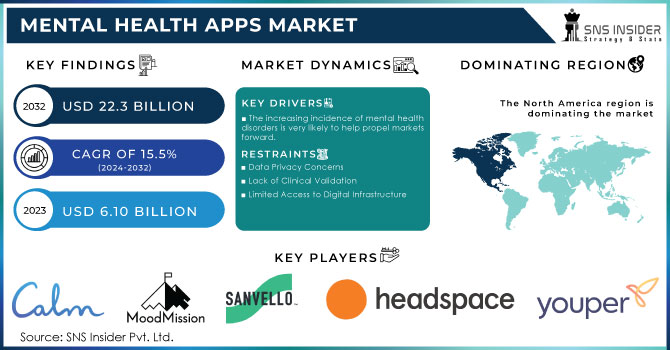Mental Health Apps Market Size, Share, and Revenue Forecast for 2024-2032
Mental Health Apps Market Size, Share, and Revenue Forecast for 2024-2032
|
The mental health apps market is poised for remarkable growth, with its revenue projected to experience a significant surge in the coming years. As awareness of mental health challenges continues to rise globally, people are increasingly turning to mobile applications as a convenient and effective means of managing their mental well-being. According to the latest report from SNS Insider, titled Mental Health Apps Market Revenue, the market is expected to witness a steady increase due to the growing adoption of digital health solutions.
Mental health apps have become a key part of the digital health ecosystem, offering individuals a range of tools and services that help them manage stress, anxiety, depression, and other mental health issues. These apps are typically designed to offer users self-guided therapy, mental wellness tracking, mindfulness exercises, mood tracking, and sometimes access to professionals for virtual consultations. The convenience of these apps and their ability to offer a degree of anonymity have made them a popular choice, especially during the pandemic, when mental health struggles surged globally. The integration of artificial intelligence (AI) and machine learning (ML) has also enhanced the functionality of these apps, providing personalized and real-time support to users. This has helped mental health apps evolve from simple tracking tools to comprehensive platforms for mental well-being. Many of these apps use AI-driven insights to suggest relevant content or exercises based on a user’s mental health history, preferences, and needs, further contributing to their effectiveness. As the market expands, the mental health app sector is likely to become even more diverse, with offerings tailored to specific demographics, such as adolescents, elderly people, and corporate employees. Various partnerships between app developers, healthcare providers, and businesses are expected to emerge, creating new revenue streams and enhancing the overall reach of mental health applications. Get Free Sample Report@ https://www.snsinsider.com/sample-request/2838 One of the key drivers for this market growth is the increasing prevalence of mental health conditions worldwide. According to the World Health Organization (WHO), one in four people will experience a mental health issue at some point in their lives. As a result, governments and private organizations have begun to invest heavily in mental health initiatives, making mental health apps an essential part of global healthcare strategies. Additionally, the stigma surrounding mental health is gradually decreasing, and more individuals are seeking help through accessible platforms like mobile apps. The pandemic played a major role in the rising demand for mental health support, with many individuals turning to these apps for relief due to the limitations on in-person visits to mental health professionals. As telemedicine and digital health services gained traction during this period, mental health apps saw an unprecedented rise in downloads, usage, and revenue. Even as the world adjusts to post-pandemic life, the demand for these apps continues to grow, with consumers becoming more comfortable with digital healthcare solutions. Additionally, technological advancements and continuous innovation in the mental health apps market have helped improve accessibility, making them a viable solution for people in remote or underserved areas. These apps are providing users with easier access to mental health resources that they may not have been able to reach before. As smartphone penetration increases globally, so too does the potential for these apps to reach a broader audience, further contributing to the market's growth. The mental health apps market is expected to see substantial revenue growth over the next few years, driven by factors like the rising global awareness of mental health, the growing prevalence of mental health disorders, increased government funding, and technological innovations. According to SNS Insider's report, the mental health apps market is anticipated to achieve significant revenue milestones by 2030, with a projected compound annual growth rate (CAGR) that reflects strong demand and investment in the sector. In terms of regional dynamics, North America holds the largest market share due to high smartphone penetration and an increasing number of tech-savvy consumers. However, the Asia-Pacific region is expected to witness the fastest growth due to rising smartphone adoption, increased mental health awareness, and a growing middle class. Europe is also a significant market, with many countries actively supporting digital mental health solutions. As the market matures, several key players are likely to emerge, including both established healthcare companies and tech firms entering the digital health space. The competition in the market will drive continuous innovation and improvements, resulting in more personalized and effective mental health solutions for users. In conclusion, the mental health apps market is set to experience impressive growth, driven by increased adoption, technological advancements, and a growing global focus on mental well-being. With their ability to provide users with accessible and convenient support, these apps are becoming an integral part of the mental health landscape, helping individuals manage and improve their mental health in a way that fits into their daily lives. About Us: Contact Us: Mayur Pande |
| Free forum by Nabble | Edit this page |


